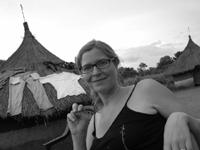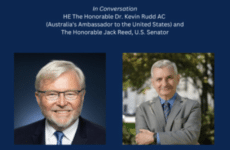By: Timothy Hanrahan
Posted In: News

Photo credit: www.uwinnipeg.ca
Dr. Erin Baines
NEWPORT, R.I. – Faculty members, students and visitors gathered at Salve Regina University’s Pell Center at Feb. 11, 2009 to listen to Dr. Erin Baines of the University of British Columbia’s Liu Institute for Global Issues present “To Catch Wings and Fly Away: Reflections on Resistance and Resilience of Forced Wives in the Lord’s Resistance Army.” Dr. Baines’ presentation was the first part of Salve Regina University’s “Courage to Speak” lecture series and also the first presentation given at the Pell Center without the late Sen. Claiborne Pell’s presence.
Dr. Baines serves as Research Director of the Justice and Reconciliation Project at the University of British Columbia. During her stay in Africa, she researched the people affected by war in northern Uganda. Dr. Baines was also involved with peace talks between government officials and rebel leaders. While in Uganda Dr. Baines discovered something startling. “There was something missing from this project and also amongst the local population and that there was the experiences of women who had been abducted as school girls and forced to become the wives of the (rebel) senior command,” Dr. Baines said. Dr. Baines went on to tell the story of Lucy, a Ugandan woman who had been abducted from her village as a child and forced to marry the leader of the Lord’s Resistance Army (LRA), Joesph Kony. The LRA, formed in 1987, has waged war for over 20 years in three countries: the Democratic Republic of Congo, Sudan and Uganda. Kony believes he is a representative of God and aims to establish a new theocratic state. The LRA is notorious for abducting children to serve as child soldiers and forced wives; also the U.S. State Department classifies the LRA as a terrorist organization. Lucy was just 12 years old when abducted by the LRA. Knowing that she was far too young to become Kony’s wife, Lucy immediately tried to escape. She was caught, punished with 300 lashes with a cane and brutally raped by Kony after recovering from her injuries. As a result of the rape, Lucy became pregnant for the first time. After a decade of being Kony’s wife and bearing his children, Lucy managed to escape during a gun battle between LRA and Ugandan government forces. Remarkably, during that very same fight, she gave birth on the battlefield. Lucy would later be picked up by government forces and carried to safety. Dr. Baines met Lucy while she was in northern Uganda; however, at the time she did not realize just how incredibly important Lucy is. “Kony really loved Lucy and would not hold the peace talks unless she was present,” said Dr. Baines. Brazenly, Lucy traveled in a convoy deep into rebel territory in order to engage Kony. The rebel leader initially mandated to Lucy that she would have to remain behind after the negotiations. Lucy insisted on making up her own mind and refused.”Alright, you can stay, but only if you promise to come back,” said Dr. Baines quoting Kony, “and she did (return) five more times.” “I’ve spoken with many people involved in the peace process that took place over two years and no one has had the influence and the power over Joseph Kony as Lucy has,” said Dr. Baines. “I even recall overhearing Lucy on the phone with Joseph Kony saying, ‘if you don’t sign the agreement, I’m going to find another man.”‘ Lucy proved not to be bluffing either and indeed did find another man and got pregnant in order to have Kony lose interest in her. Today while Lucy is not caring for her children and her younger siblings in her villiage of Gulu, Dr. Baines and her grassroots organization Peace Girl have been teaching Lucy and other women affected by the conflict in northern Uganda how to operate film equipment, create story narration and speak English in order to make a film which tells their story to the world. “The only way we can bridge that distance (between Westerners and war torn Africans) is by bringing these stories front and center in ways that make people pay attention,” Dr. Baines said in a separate interview. “We (Westerners) are incredibly powerful people, we have access to more information than anybody in the history of the world and knowledge is power. When we start to learn about atrocities such as this, we’ll be able to make the arguments when we meet our government representatives in order to put pressure on the people who should be accountable for such things.”













